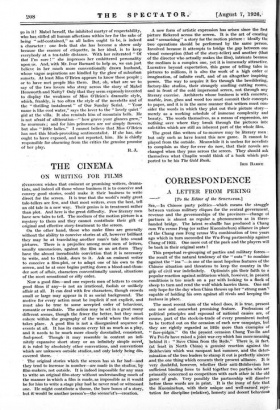THE CINEMA
ON WRITING FOR FILMS
EVERYONE wishes that eminent or promising writers, drama- tists, and indeed all those whose business it is to conceive and convey good stories, could make it their business to write direct for the screen. It is true that the world's really great tale-tellers are few, and that most writers, even the best, tell an old tale in a new way. Their genius is in treatment rather than plot. And here is the great difficulty. Few literary men have new tales to tell. The medium of the motion picture is a mystery to them and they cannot contribute their gift of original and effective story-treatment to the screen.
On the other hand, those who make films are generally without the ability to conceive stories at all, however brilliant they may be at translating another man's tale into sound pictures. There is a prejudice among most men of letters, usually unconscious, against the film as an art-form They have the almost ineradicable conviction that it is necessary to write, and to think, down to it. Ask an eminent writer to conceive a film-plot, or to adapt one of his own to the screen, and he at once begins putting down a blood-and-thun- der sort of affair, characters conventionally unreal, situations of the most sensational or silly order.
Now a good film—and one expects men of letters to create good films if any—is not an irrational, foolish or unlikely affair at all. It can deal with few characters; though crowds small or large may appear in it as social background. The motive for every action must be implicit if not explicit, and must also be true to some accepted order of behaviour; romantic or realistic. The action may be set in a great many different scenes, though the feiver the better, but they must cohere within the geography of the world where the action takes place. A good film is not a disorganized sequence of events at all. It has its canons every bit as much as a play, and it needs to be much more closely dovetailed, consistent, 'fool-proof. Though - it may resemble in content an infi- nitely expansive short story or an infinitely simple novel, it is ruled by absolutely other conventions, and conventions which are unknown outside studios, and only-lately being dis-
covered there. - - • - - - - • The original stories which the screen has so far had—and they tend to increase in number—are 'made in the studios, by film-makers, not outside. It is indeed impossible for any man to write an original film-story without understanding much of the manner in which a film is made, as impossible as it would be for him to write a stage play had he never read or witnessed one. He might contribute a theme, the bare bones of a story, but *would be another person's—the Seenaest's--:creation. A new form of artistic expression has arisen since the first picture flickered across the screen. It is the art of creating and " scenarising " a story for the motion picture : ideally the two operations should be performed by the same person. Involved because it attempts to bridge the gap between one visual conception (that of the story-teller) and another (that of the director who actually makes the film), intricate because the medium is a complex one, yet it is immensely attractive. Lucrative beyond expectation, this game of telling tales in pictures to millions, it is also the work of a high order of imagination, of infinite craft, and of an altogether inspiring power. The way to acquire it lies through the bewildering, factory-like studios, their strangely smelling cutting moms, and in front of the cold impersonal screen, not through any literary exercise. Architects whose business is with concrete; marble, iron, glass and wood too must commit their concepts to paper, and it is in the same manner that writers must con Bider the words in which they plot out their picture story— merely as a working schedule of immense complexity and beauty. The words themselves, as a means of expression, are nothing save where they break through the pictures into sub-titles which are still an inherent part of the whole film.
The great film writers of to-morrow may be literary men but only such as have learnt this new game. It cannot be played from the outside. Meanwhile it is useless for novelists to complain as they for ever do now, that their novels - are changed when they pass across the screen. They should ask themselves what Chaplin would think of a book which put- ported to be his The Gold Rush.
IRIS BARRY






































 Previous page
Previous page